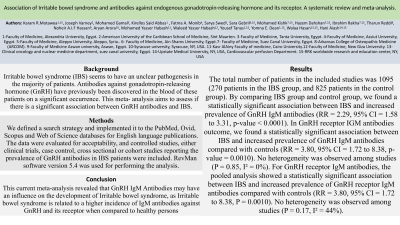Back


Poster Session B - Monday Morning
Category: IBD
B0392 - Association of Irritable Bowel Syndrome and Antibodies Against Endogenous Gonadotropin-releasing Hormone and Its Receptor. a Systematic Review and Meta-analysis
Monday, October 24, 2022
10:00 AM – 12:00 PM ET
Location: Crown Ballroom

Has Audio

Hani Aiash, MD, PhD
Upstate Medical University
New York, New York
Presenting Author(s)
Karam R.Motawea, 1, Joseph Varney, MD2, Mohamed Gamal, MBBCh3, Kirellos Said Abbas, MBBCh1, Fatma Monib, MBBCh4, Sarya Swed, MBChB5, Sara Gebril, MBBCh6, Mohamed Kishk, MBBCh7, Hazem Dahshan, MBBCh7, Ibrahim Rakha, MBBCh7, Tharun Reddi, MBBCh8, Noheir Hassan, MD9, Aryan Arora, MD10, Mohamed Yasser Habash, MD11, Waleed Yasser Habash, MBBCh12, Yousef Tanas, MBBCh1, Yomna E. Dean, MBBCh1, Walaa Hasan, MD13, Hani Aiash, MD, PhD14
1Alexandria University, Alexandria, Al Iskandariyah, Egypt; 2American University of the Caribbean School of Medicine, St. Maarten, NY; 3Tanta University, Tanta, Asyut, Egypt; 4Assiut University, Asyut, Asyut, Egypt; 5Aleppo University, Aleppo, Halab, Syria; 6Ain Shams University, Ain Shams, Bani Suwayf, Egypt; 7Suez Canal University, Suez Canal, As Suways, Egypt; 8Arkansas College of Osteopathic Medicine, New York, NY; 9Aswan University, Aswan, Aswan, Egypt; 10Syracuse University, New York, NY; 11Cairo University, Cairo, Al Qahirah, Egypt; 12New Giza University, Giza, Al Jizah, Egypt; 13Suez Canal University, Ismailia, Al Isma'iliyah, Egypt; 14Upstate Medical University, New York, NY
Introduction: Irritable bowel syndrome (IBS) seems to have an unclear pathogenesis in the majority of patients. Antibodies against gonadotropin-releasing hormone (GnRH) have previously been discovered in the blood of these patients on a significant occurrence. This meta- analysis aims to assess if there is a significant association between GnRH antibodies and IBS.
Methods: We defined a search strategy and implemented it to the PubMed, Ovid, Scopus and Web of Science databases for English language publications. The data were evaluated for acceptability, and controlled studies, either clinical trials, case control, cross sectional or cohort studies reporting the prevalence of GnRH antibodies in IBS patients were included. RevMan software version 5.4 was used for performing the analysis.
Results: The total number of patients in the included studies was 1095 (270 patients in the IBS group, and 825 patients in the control group). By comparing IBS group and control group, we found a statistically significant association between IBS and increased prevalence of GnRH IgM antibodies (RR = 2.29, 95% CI = 1.58 to 3.31, p-value < 0.0001). No heterogeneity was observed among studies (P = 0.20, I² = 36%). In GnRH receptor IGM antibodies outcome, we found a statistically significant association between IBS and increased prevalence of GnRH IgM antibodies compared with controls (RR = 3.80, 95% CI = 1.72 to 8.38, p-value = 0.0010). No heterogeneity was observed among studies (P = 0.85, I² = 0%). For GnRH receptor IgM antibodies, the pooled analysis showed a statistically significant association between IBS and increased prevalence of GnRH receptor IgM antibodies compared with controls (RR = 3.80, 95% CI = 1.72 to 8.38, P = 0.0010). No heterogeneity was observed among studies (P = 0.17, I² = 44%).
Discussion: This current meta-analysis revealed that GnRH IgM Antibodies may have an influence on the development of Irritable bowel syndrome, as Irritable bowel syndrome is related to a higher incidence of IgM antibodies against GnRH and its receptor when compared to healthy persons. More multicenter studies with higher sample sizes are needed to support our findings.
Disclosures:
Karam R.Motawea, 1, Joseph Varney, MD2, Mohamed Gamal, MBBCh3, Kirellos Said Abbas, MBBCh1, Fatma Monib, MBBCh4, Sarya Swed, MBChB5, Sara Gebril, MBBCh6, Mohamed Kishk, MBBCh7, Hazem Dahshan, MBBCh7, Ibrahim Rakha, MBBCh7, Tharun Reddi, MBBCh8, Noheir Hassan, MD9, Aryan Arora, MD10, Mohamed Yasser Habash, MD11, Waleed Yasser Habash, MBBCh12, Yousef Tanas, MBBCh1, Yomna E. Dean, MBBCh1, Walaa Hasan, MD13, Hani Aiash, MD, PhD14. B0392 - Association of Irritable Bowel Syndrome and Antibodies Against Endogenous Gonadotropin-releasing Hormone and Its Receptor. a Systematic Review and Meta-analysis, ACG 2022 Annual Scientific Meeting Abstracts. Charlotte, NC: American College of Gastroenterology.
1Alexandria University, Alexandria, Al Iskandariyah, Egypt; 2American University of the Caribbean School of Medicine, St. Maarten, NY; 3Tanta University, Tanta, Asyut, Egypt; 4Assiut University, Asyut, Asyut, Egypt; 5Aleppo University, Aleppo, Halab, Syria; 6Ain Shams University, Ain Shams, Bani Suwayf, Egypt; 7Suez Canal University, Suez Canal, As Suways, Egypt; 8Arkansas College of Osteopathic Medicine, New York, NY; 9Aswan University, Aswan, Aswan, Egypt; 10Syracuse University, New York, NY; 11Cairo University, Cairo, Al Qahirah, Egypt; 12New Giza University, Giza, Al Jizah, Egypt; 13Suez Canal University, Ismailia, Al Isma'iliyah, Egypt; 14Upstate Medical University, New York, NY
Introduction: Irritable bowel syndrome (IBS) seems to have an unclear pathogenesis in the majority of patients. Antibodies against gonadotropin-releasing hormone (GnRH) have previously been discovered in the blood of these patients on a significant occurrence. This meta- analysis aims to assess if there is a significant association between GnRH antibodies and IBS.
Methods: We defined a search strategy and implemented it to the PubMed, Ovid, Scopus and Web of Science databases for English language publications. The data were evaluated for acceptability, and controlled studies, either clinical trials, case control, cross sectional or cohort studies reporting the prevalence of GnRH antibodies in IBS patients were included. RevMan software version 5.4 was used for performing the analysis.
Results: The total number of patients in the included studies was 1095 (270 patients in the IBS group, and 825 patients in the control group). By comparing IBS group and control group, we found a statistically significant association between IBS and increased prevalence of GnRH IgM antibodies (RR = 2.29, 95% CI = 1.58 to 3.31, p-value < 0.0001). No heterogeneity was observed among studies (P = 0.20, I² = 36%). In GnRH receptor IGM antibodies outcome, we found a statistically significant association between IBS and increased prevalence of GnRH IgM antibodies compared with controls (RR = 3.80, 95% CI = 1.72 to 8.38, p-value = 0.0010). No heterogeneity was observed among studies (P = 0.85, I² = 0%). For GnRH receptor IgM antibodies, the pooled analysis showed a statistically significant association between IBS and increased prevalence of GnRH receptor IgM antibodies compared with controls (RR = 3.80, 95% CI = 1.72 to 8.38, P = 0.0010). No heterogeneity was observed among studies (P = 0.17, I² = 44%).
Discussion: This current meta-analysis revealed that GnRH IgM Antibodies may have an influence on the development of Irritable bowel syndrome, as Irritable bowel syndrome is related to a higher incidence of IgM antibodies against GnRH and its receptor when compared to healthy persons. More multicenter studies with higher sample sizes are needed to support our findings.
Disclosures:
Karam R.Motawea indicated no relevant financial relationships.
Joseph Varney indicated no relevant financial relationships.
Mohamed Gamal indicated no relevant financial relationships.
Kirellos Said Abbas indicated no relevant financial relationships.
Fatma Monib indicated no relevant financial relationships.
Sarya Swed indicated no relevant financial relationships.
Sara Gebril indicated no relevant financial relationships.
Mohamed Kishk indicated no relevant financial relationships.
Hazem Dahshan indicated no relevant financial relationships.
Ibrahim Rakha indicated no relevant financial relationships.
Tharun Reddi indicated no relevant financial relationships.
Noheir Hassan indicated no relevant financial relationships.
Aryan Arora indicated no relevant financial relationships.
Mohamed Yasser Habash indicated no relevant financial relationships.
Waleed Yasser Habash indicated no relevant financial relationships.
Yousef Tanas indicated no relevant financial relationships.
Yomna E. Dean indicated no relevant financial relationships.
Walaa Hasan indicated no relevant financial relationships.
Hani Aiash indicated no relevant financial relationships.
Karam R.Motawea, 1, Joseph Varney, MD2, Mohamed Gamal, MBBCh3, Kirellos Said Abbas, MBBCh1, Fatma Monib, MBBCh4, Sarya Swed, MBChB5, Sara Gebril, MBBCh6, Mohamed Kishk, MBBCh7, Hazem Dahshan, MBBCh7, Ibrahim Rakha, MBBCh7, Tharun Reddi, MBBCh8, Noheir Hassan, MD9, Aryan Arora, MD10, Mohamed Yasser Habash, MD11, Waleed Yasser Habash, MBBCh12, Yousef Tanas, MBBCh1, Yomna E. Dean, MBBCh1, Walaa Hasan, MD13, Hani Aiash, MD, PhD14. B0392 - Association of Irritable Bowel Syndrome and Antibodies Against Endogenous Gonadotropin-releasing Hormone and Its Receptor. a Systematic Review and Meta-analysis, ACG 2022 Annual Scientific Meeting Abstracts. Charlotte, NC: American College of Gastroenterology.
